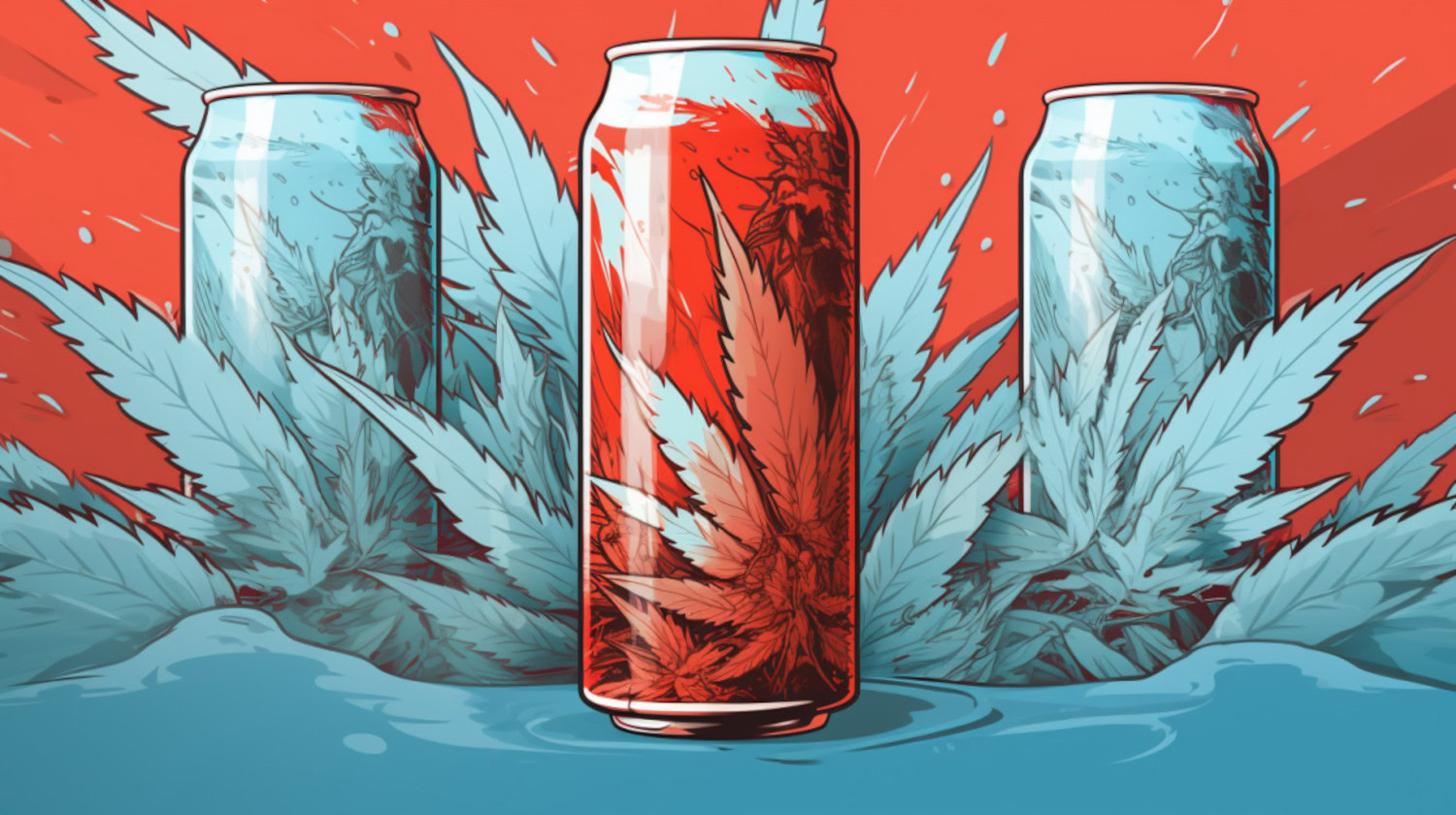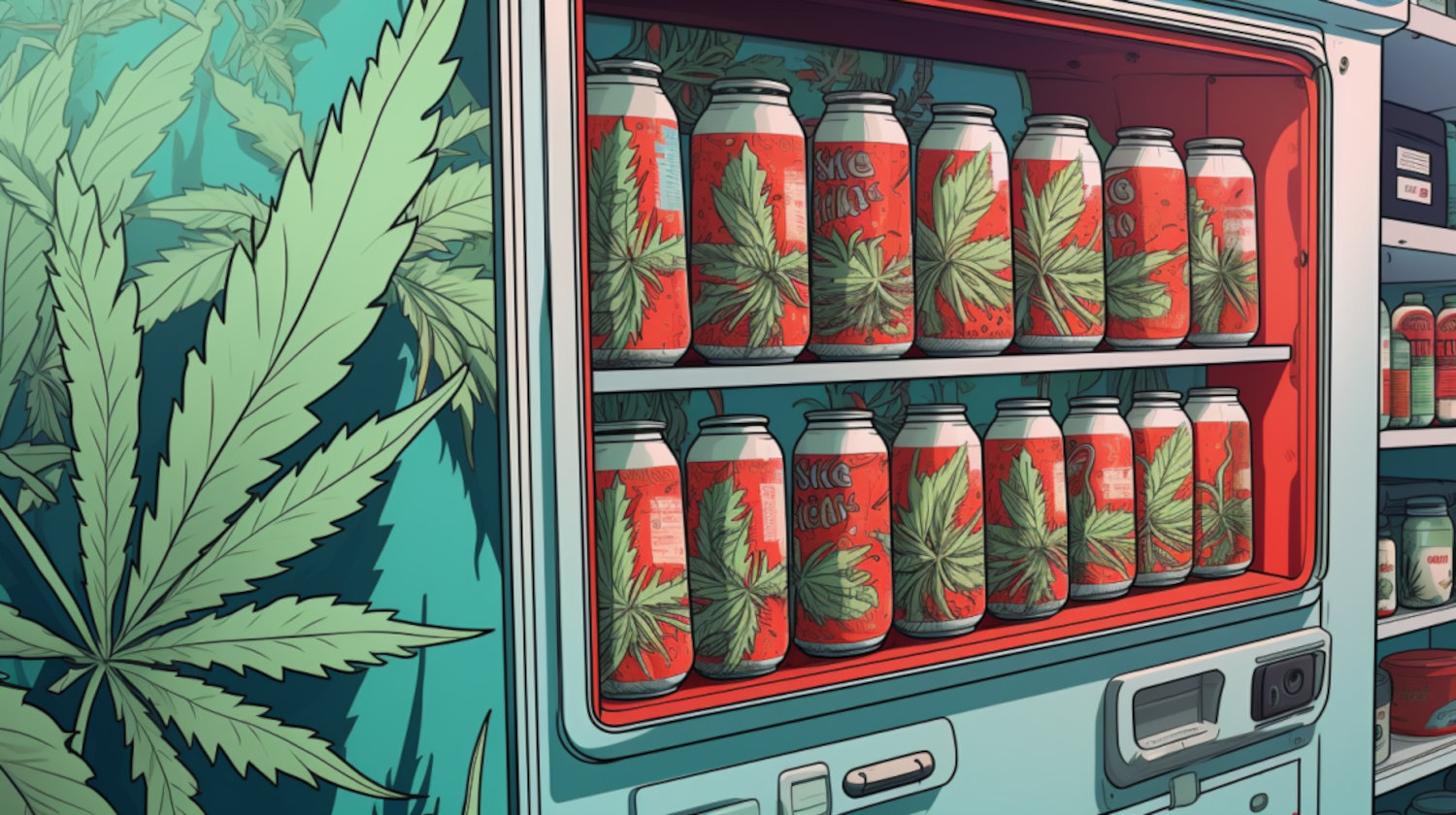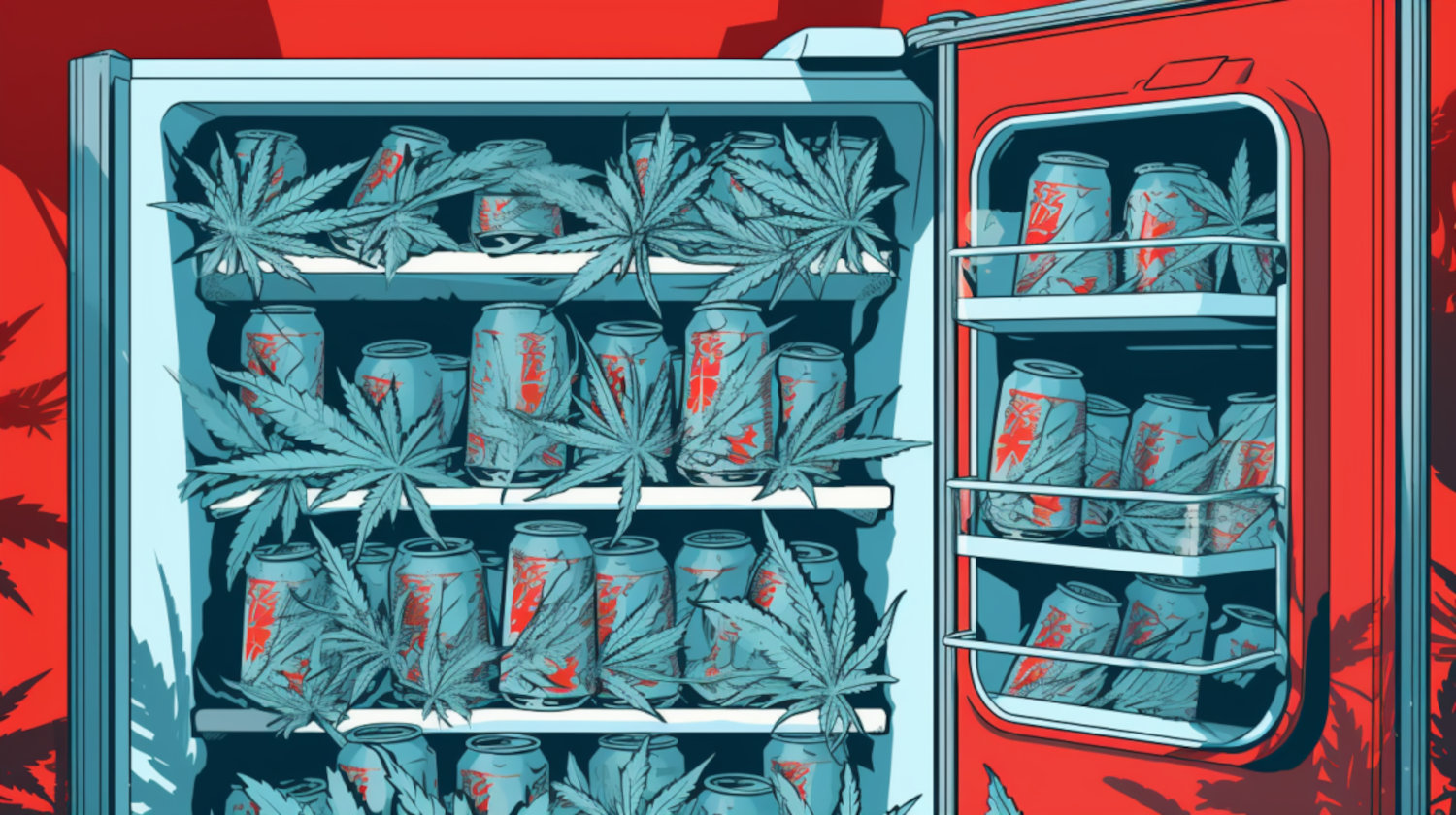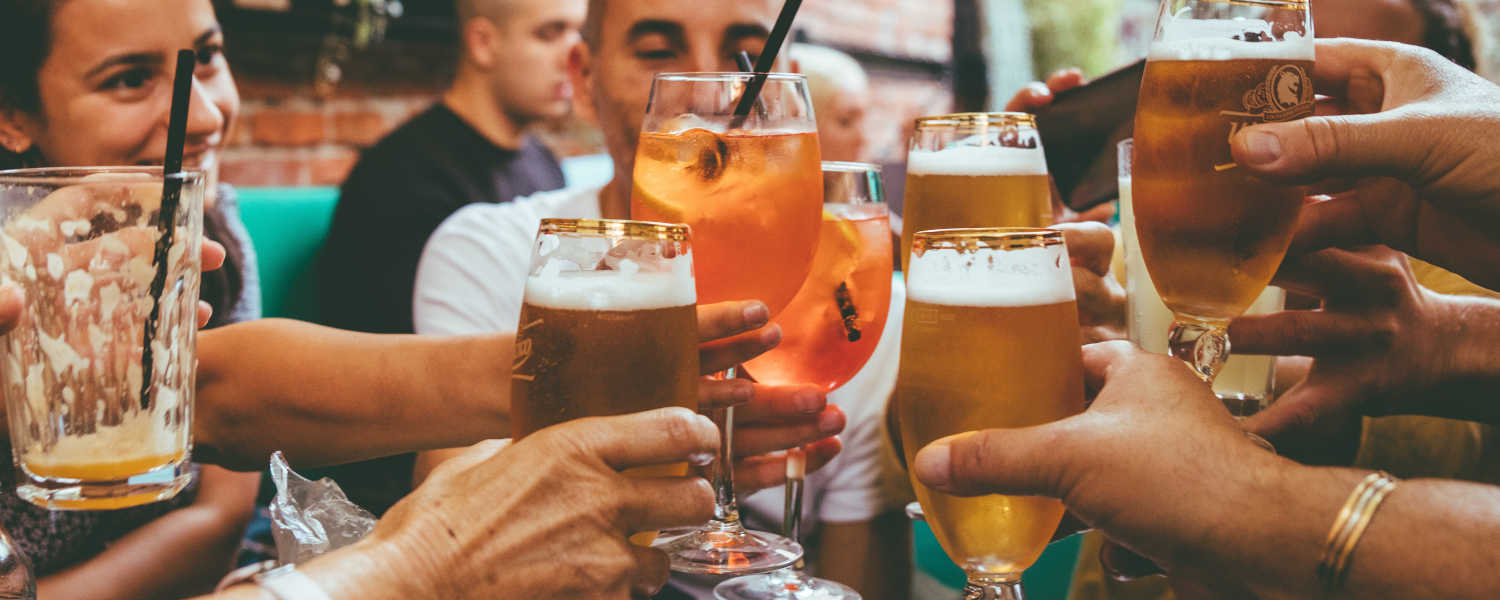Key Takeaways
- CBD drinks are non-alcoholic beverages infused with CBD.
- Unless purchased at a licensed dispensary, these drinks generally contain less than 0.3% THC and are non-intoxicating.
- CBD drinks deliver the benefits of CBD, including possibly helping with anxiety, epilepsy, and chronic pain.
Cannabidiol, or CBD, is a multi-purpose cannabis compound with various remedial properties. It has shown potential to have antioxidant, anti-inflammatory, and anti-anxiety benefits.1
Cannabinoids like CBD are infused into beverages that may provide rapid-onset effects. CBD-infused drinks are not limited to water and seltzers. They are available in a broad spectrum of flavors to treat every palate. The market also features mocktails, energy drinks, teas, coffees, and various hemp drinks.
So, what exactly are CBD drinks, how do they work, and how can you find the best options near you?
What are CBD Drinks?
The isolated CBD compound is non-intoxicating. Hemp is naturally enriched with cannabidiol (CBD), which can be extracted from the plant and transformed into CBD water, CBD seltzer, and other types of CBD drinks.
The plant flowers are initially turned into an extract by blending a solvent with raw cannabis materials. Once this step is complete, the hemp-derived CBD oil undergoes an emulsification process since cannabinoids are highly lipophilic compounds that bind better with oils, fats, and waxes than water.
Although CBD's oral bioavailability is relatively low in humans, manufacturing techniques like nanoemulsion technology may amplify the bioavailability of CBD particles by up to five times.2 This technique shrinks the cannabinoid's particle size and cloaks it in a water-based solution, resulting in water-soluble CBD that can be added to other liquids like seltzers.
CBD nano drinks are made by processing the cannabinoid into minuscule nanoparticles, usually measuring less than 100 nanometers.
What is CBD Water?
If the name didn't tell you already, CBD water is water infused with – you guessed it – CBD. In most cases, infused water will resemble any other bottle, can, or glass of water. Some may come with additional hues or colors if they're using flavored or dye powder. But in most cases, CBD water resembles the regular clear stuff from your tap or water filter.
CBD water is made by infusing water with CBD. Since oil and water don't mix, companies may sometimes use proprietary drink powder to infuse products. Another popular, often proprietary, method is nanoemulsion, an extraction process that makes oil particles minuscule and water-soluble.
Once infused, CBD water potencies range between a low dose (1 to 5 mg of CBD) and much higher concentrations. Most higher-dose items sold in stores will be around 10 mg or 20 mg of CBD per can or bottle. However, numerous companies have rolled out CBD water products containing 25 mg and more in each bottle.
Why choose a CBD drink made from hemp rather than high-THC cannabis?
Hemp became legal on the federal level in 2018 with the passing of the USDA Farm Bill. Per the bill, CBD must contain 0.3% of THC or less to be considered legal. The legislation made it easier for companies to create and sell CBD beverages, expanding accessibility to many Americans.
Aside from the accessibility, consumers often lean towards CBD drinks for their diverse range of flavors. CBD drinks also have rapid onset effects, non-intoxicating but potentially therapeutic effects, and efficient cannabinoid bioavailability.
Depending on the brand and product type, CBD-infused drinks get their palatability from natural and artificial flavorings. Terpenes, some of the aromatic compounds present in cannabis, can also give CBD drinks their flavor. Not only do terpenes like myrcene, caryophyllene, limonene, and linalool harbor their unique taste and smell, but each compound also has various potential therapeutic effects.
Advantages of CBD Infused Drinks

Not only can CBD drinks be discreet, but they are also viewed as a healthier alternative to the inhalation of CBD flower or concentrates.3 In addition, CBD drinks may have potential benefits for patients with anxiety, cardiovascular diseases, diabetes, epilepsy, psychotic disorders, pain, sleep, and even cancer treatment.1
Some significant potential benefits of CBD include:
- Cancer—In preclinical animal and cell line studies, researchers have demonstrated the potential of CBD to inhibit cancer cell growth and induce cell death in unhealthy cells. CBD’s anti-cancer potential may be mediated through several pathways, including the CB1 and CB2 receptors and the transient receptor potential vanilloid (TRPV) channel. These effects may show promise in cancers like breast, lung, colon, prostate, colorectal, glioma, leukemia/lymphoma, and endocrine cancer.4
- Anxiety—When a group of healthy volunteers consumed 300 mg CBD before a public speaking test, they reported feeling less anxious. A 300 mg CBD dosage proved more effective than a 100 or 900 mg dosage.1
- Epilepsy—CBD has been demonstrated to be an excellent choice for treating certain epileptic conditions. These positive responses are thought to result from CBD’s interaction with various receptor channels involved in epilepsy, such as the transient receptor potential vanilloid (TRPV) channel, serotonin receptors, and opioid receptors.1
- Chronic Pain—Drinking non-alcoholic CBD-rich cocktails may benefit patients with chronic pain, according to some research. Due to the effects of CBD on the CB2 receptors, it can promote anti-inflammatory responses, which may help reduce pain. The usage of CBD for pain has also shown the potential to decrease dependence on pharmaceutical opioids.1
Drawbacks of CBD Drinks
First-time CBD consumers should approach CBD drinks cautiously. The market is brimming with new brands, so product quality may be unreliable. Unfortunately, many producers try to cut corners by skipping laboratory testing, which can result in CBD seltzers containing unlisted compounds like tetrahydrocannabinol (THC). Furthermore, CBD may degrade faster if the drink is stored under bright supermarket shelves in improper packaging.
A recent study of 84 CBD products purchased online by Marcel Bonn-Miller, an assistant professor of psychology at the University of Pennsylvania, revealed that 18 of the products contained THC.1
THC may cause adverse side effects, including dry mouth, dry eyes, dizziness, and fatigue. The compound may also react with other substances — such as alcohol and illicit drugs — and could also lead to failed drug tests.
Tips for Buying CBD Infused Drinks

Coinciding with the development of the CBD-infused drink sector, industry-wide standards are urgently needed to maintain consumer quality and safety.
The labels should clearly outline the production method, e.g., nanoemulsion or traditional techniques. It’s also best to confirm the composition of the liquid before buying.
Consume CBD water and other types of hemp drinks with confidence by purchasing from reputable sources. Always choose well-known brands that feature independent reviews on their website, and request third-party lab testing results to ensure maximum quality control. Product manufacturers and distributors should conduct analytical testing for contaminants (e.g., heavy metals, molds, and pesticides) in addition to manufacturing and labeling their products under the necessary controls.5
Avoid CBD seltzer companies that don't follow these procedures. According to a relatively recent study published in JAMA Network Open, a mere third of CBD products that underwent analytical testing featured accurate labeling for cannabinoid quantity and potency.5
Cannabinoid composition and dosage determine the overall effect(s). For example, CBD cocktails should not contain THC unless the label indicates it. Unknowingly consuming psychotropic compounds like THC puts you at risk of experiencing mind-altering effects, which could be hazardous if you are driving or operating heavy machinery.
5 of the Best CBD Drinks

Do you need help deciding which product(s) to choose? Consider adding the following CBD drinks to your shopping list:
- WYLD CBD - Wyld’s CBD seltzers come in flavors like raspberry, blackberry, or grapefruit. Each can contain 20-25 mg of CBD. Some options also include a dose of cannabinol (CBN).
- Zentopia - Whether you choose the Watermelon, Lime, or Mango CBD drink from Zentopia, you'll get 50mg of CBD with no calories, sugar, or THC.
- Drink Cann - Cann is an award-winning CBD water. Their starter Pack (18 cans) of flavors like Orange Cardamom, Lemon Lavender, Grapefruit Rosemary, Ginger Lemongrass, and Pineapple Jalapeño with varying levels of THC and CBD.
- VYBES - This company's hemp drinks are available to purchase individually or in packs of flavors, such as Strawberry Lavender, Blueberry Mint, and Peach Ginger. Each drink contains 25mg Hemp CBD and 45 mg Magnesium for an added health boost.
- Daytrip - Daytrip CBD Sparkling water is sugar- and carb-free. Popular flavors include Blackberry, Coconut Pineapple, and Lemon Lime. Drinks contain 25 mg CBD, and Daytrip also sells hemp CBD-infused gummies.
If you'd rather try THC-infused beverages, there are plenty of options there, though they are only available in legal markets or to those with a valid medical cannabis card.
References
- Peng J, Fan M, An C, Ni F, Huang W, Luo J. A narrative review of molecular mechanism and therapeutic effect of cannabidiol (CBD). Basic & Clinical Pharmacology & Toxicology. 2022;130(4):439-456. doi:https://doi.org/10.1111/bcpt.13710 ↩︎
- Nakano Y, Tajima M, Sugiyama E, Sato VH, Sato H. Development of a Novel Nano-emulsion Formulation to Improve Intestinal Absorption of Cannabidiol. Med Cannabis Cannabinoids. 2019;2(1):35-42. Published 2019 Apr 4. doi:10.1159/000497361 ↩︎
- Spindle TR, Bonn-Miller MO, Vandrey R. Changing landscape of cannabis: novel products, formulations, and methods of administration. Curr Opin Psychol. 2019;30:98-102. doi:10.1016/j.copsyc.2019.04.002 ↩︎
- Seltzer ES, Watters AK, MacKenzie D Jr, Granat LM, Zhang D. Cannabidiol (CBD) as a Promising Anti-Cancer Drug. Cancers (Basel). 2020;12(11):3203. Published 2020 Oct 30. doi:10.3390/cancers12113203 ↩︎
- Li J, Carvajal R, Bruner L, Kaminski NE. The current understanding of the benefits, safety, and regulation of cannabidiol in consumer products. Food Chem Toxicol. 2021;157:112600. doi:10.1016/j.fct.2021.112600 ↩︎
The information in this article and any included images or charts are for educational purposes only. This information is neither a substitute for, nor does it replace, professional legal advice or medical advice, diagnosis, or treatment. If you have any concerns or questions about laws, regulations, or your health, you should always consult with an attorney, physician or other licensed professional.




